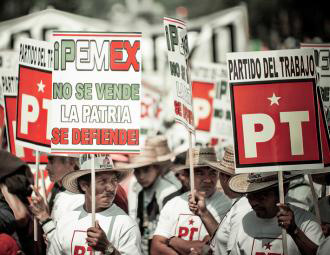
|  |  |  Editorials | Issues | November 2008 Editorials | Issues | November 2008  
Mexico's Right Wins Oil Privatization
 Todd Chretien - Socialist Worker Todd Chretien - Socialist Worker
go to original


| | Protesters demonstrate against oil privatization in Mexico City (Ricardo Shuck) | | |
In a major victory for Mexico's President Felipe Calderón and his right-wing National Action Party (PAN), both houses of Congress overwhelmingly voted to privatize Mexico's state oil company PEMEX.

Ex-presidential candidate Andrés Manuel López Obrador (AMLO, as he is known in Mexico) led resistance to the sell-off with more than a year of mass marches, sit-ins and civil disobedience. Hundreds of "brigades" of nonviolent direct action activists formed across Mexico, and AMLO toured the country, speaking to huge crowds.

In July 2006, AMLO was the Party of the Democratic Revolution's (PRD) candidate for president, and he was almost certainly elected president. But PAN electoral fraud put Calderón in power. AMLO and his followers have never recognized Calderon and continue to refer to AMLO as the "legitimate president."

Millions of Mexicans actively opposed the privatization and took part in popular referendums, but Calderón relied on repression and control of the state apparatus to ram it through.

On the day of the vote, AMLO led tens of thousands of protesters to the doors of the National Assembly. The movement was strong enough to force the PAN leadership of Congress to agree to meet with AMLO before the vote, allowing him a 30-minute speech opposing privatization.

Before voting started, some 30 left-wing deputies took over the podium in an unsuccessful attempt to disrupt the process. But the vote itself revealed the balance of forces within the political system.

The Party of the Institutional Revolution (PRI), which ruled Mexico as a one-party state for most of the 20th century and is now the second biggest in the assembly behind the PAN, actively supported Calderón, as did the tiny Mexican Green Party. The Green Party was created by the PRI as a means to absorb protest votes in the 1980s and generally remains loyal to Mexico's corrupt political establishment, so its support came as no surprise.

However, while some PRD congressional representatives voted against the privatization, along with the small Workers Party (PT), a majority of PRD senators and a large number of deputies in the lower house broke with AMLO and voted in favor of privatization, exposing a deep schism within the PRD between the left and the right, and raising the possibility of a split in the party.

IN THE 1930s, President Lazaro Cardenas enacted a major land reform and nationalized PEMEX, which served as a point of national pride in the years since, and a major source of revenue for the state.

Cardenas' two actions, together with a boom in the world economy, led to a 30-year period of economic growth, during which employment and wages rose, and poverty fell. Although millions of Mexicans remained mired in poverty, millions more enjoyed a relative improvement in their standards of living up through the 1970s - until the birth of pro-free market neoliberalism in the 1980s.

Since then, most state enterprises have been sold off, public services were slashed, wages were cut by more than 50 percent, and, thanks to NAFTA, millions of farmers have been kicked off their land.

The battle over the privatization of PEMEX was seen by both sides as a fight over whether or not to continue with neoliberal policies. Calderón's victory - and perhaps even more tellingly, the split in the PRD - shows that the right wing in Mexico continues to dominate the political system.

However, the economic crisis that is dragging down the U.S. economy is hitting Mexico twice as hard. Since August, Mexico's most important export, oil, has fallen from $140 to $62 a barrel, causing a rapidly increasing government deficit and leading to a 25 percent decline in the value of the peso.

On October 30, in the wake of the oil privatization vote, AMLO proposed a wide-ranging program to a crowd of thousands of anti-privatization activists. He made the case for the movement to stop the privatization of PEMEX to be transformed into one that fought to put the economic priorities of the working class and farmers ahead of those of Mexico's rich and their international partners.

According to La Jornada, the daily left-leaning newspaper from Mexico City, AMLO's proposals include providing credits to small businesses and farmers on the condition that they do not fire any workers; protecting savings and pensions for state workers and the middle class; strengthening education, health and youth services; extending programs to the disabled and elderly; freezing food, gas and utility prices; and launching a program of public works projects.

How this movement responds in the coming months to the defeat over PEMEX and to the betrayal of the majority of the PRD's leadership will tell a lot about the shape of Mexican politics in the coming years. |

 |
|  |



